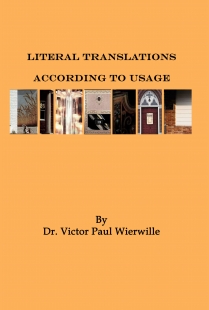Literal Translations According to Usage
"Dr. Wierwille asked me to share with you the definitions of different translations. For example a literal translation. You all know what it is. If not, I'll give it to you. A literal translation is a word-for-word translation. You have it in your interlinear with a very literal translation. But a literal according to usage is what we generally try to express in our translation work. A literal according to usage is a translation which reproduces the thoughts and meanings of the original based on the words in the original in relation to the verse, the context, the remoter context, and to whom it's written, that expresses the heart of what a translation ought to be. A literal according to usage in which you would not try to reproduce the construction of the original, but rather the thoughts and meanings of the original. That's to be based on the actual words that are in the original in relation to the foundational principles: the verse, the context, the remoter context, and to whom it's written. Then an expanded translation. This is another thing which we have done in the ministry. An expanded translation is a translation which reproduces the original with many alternative meanings and explanatory renderings. This would go into greater detail to expound what a literal according to usage would give you. It would give you much more explanation in order for you to understand that thought and the meanings of the original. A free [translation] or paraphrase (which we do not do) is a translation which gives the gist of the original without corresponding to each word used in the original. It would be a very free translation, a paraphrase, giving only the gist, rather than trying to stick as close as possible to the words of the original. That's how it differs from an expanded. There have been translations done along that line."
The Literal Translations According to Usage is a translation of the Holy Scriptures which endeavors to reproduce the thoughts and meanings of the original God-breathed Word found in the seven Church epistles and the Pastoral epistles. This work is a result of exhaustive Biblical research conducted by Dr. Victor Paul Wierwille, along with the assistance of a team of scholars in various fields of related research. That work closely examined the Critical Greek, Hebrew and Aramaic texts, along with the application of the keys to Biblical interpretation; carefully considering the individual words in relation to the verse, the context, the remoter context, and to whom it is written. In addition, figures of speech, Orientalisms, and secular references were also considered. These Literal Translations According to Usage of the Church epistles will enable the reader to gain a rich, vital understanding of the great revelation specifically addressed to the Church today.
Publication Date: March 14, 2013
Pages: 378
Victor Paul Wierwille was a Bible scholar and teacher for over four decades.
By means of Dr. Wierwille's dynamic teaching of the accuracy and integrity of God's Word, foundational class and advanced class graduates of Power for Abundant Living have learned that the one great requirement for every student of the Bible is to rightly divide the Word of Truth. Thus, his presentation of the Word of God was designed for students who desire the in-depth-accuracy of God’s Word.
In his many years of research, Dr. Wierwille studied with such men as Karl Barth, E. Stanley Jones, Glenn Clark, Bishop K.C. Pillai, and George M. Lamsa. His formal training included Bachelor of Arts and Bachelor of Theology degrees from Mission House (Lakeland) College and Seminary. He studied at the University of Chicago and at Princeton Theological Seminary from which he received a Master of Theology degree in Practical Theology. Later he completed his work for the Doctor of Theology degree.
Dr. Wierwille taught the first class on Power for Abundant Living in 1953.
Books by Dr. Wierwille include: Are the Dead Alive Now? published in 1971; Receiving the Holy Spirit Today published in 1972; five volumes of Studies in Abundant Living— The Bible Tells Me So (1971), The New, Dynamic Church (1971), The Word's Way (1971), God's Magnified Word (1977), Order My Steps in Thy Word (1985); Jesus Christ Is Not God (1975); Jesus Christ Our Passover (1980); and Jesus Christ Our Promised Seed (1982).
Dr. Wierwille researched God's Word, taught, wrote, and traveled worldwide, holding forth the accuracy of God's "wonderful, matchless" Word.

